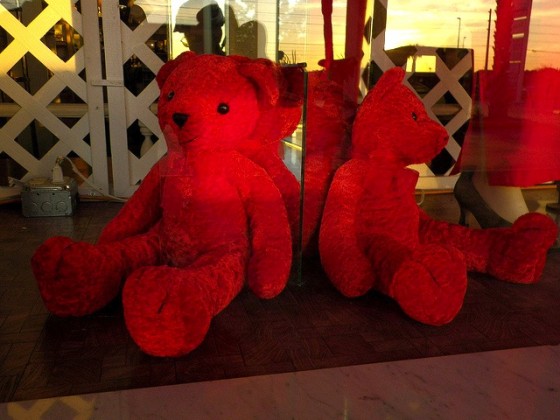As it turns out, I haven’t received a Valentine’s Day gift since 2006, but even when I wasn’t single and out saving the world, I never encouraged my boyfriends to give me chocolates or flowers. A book? A sweet card? Maybe. But since anyone can go out and buy a box of chocolates at the last minute without putting any real heart into it, having red gifts never appealed to me.
So when I read that Iraqis are celebrating a surge of red-lined shelves this Valentine’s Day after enduring war for so long all kinds of complicated thoughts arose. On the one hand, I rue this wasteful “holiday:” chocolate production and cut flowers are often associated with human rights violations and environmental devastation, but on the other hand, how can I begrudge Iraqis a bit of lighthearted fun?
Valentine’s Day is for everybody
“Valentine’s Day is for everybody — not only for lovers,” an Iraqi school administrator named Lina told the Jordan Times, adding that, “It’s for you and I, for me and my brother, even for someone on the street. It’s not just about me and my fiancé… Iraqis need happy moments to make them forget what they have been through — we have had enough sadness.”
Nina was browsing through stocks of all kinds of red “stuff” – teddy bears, lip-shaped pillows, red scented candles, heart-shaped purses, and even silky nighties. Having access to this suggestive merchandise is a new thing in Iraq, which is a conservative country, and Nina associates it with a new found openness and happiness even as bombs continue to fall in certain neighborhoods.
Conservative Muslims are concerned about this new trend since they fear it will usher in a more casual western attitude toward relationships, but one shopkeeper told the paper that he expects to sell all of his love goods since the holiday is becoming increasingly popular.
This is a huge step in the right direction. Unmarried people can show their affection for one another without fear that the moral police will nab them and a more loving ethos will become increasingly acceptable. But what will it take to dispel the notion that love can be expressed with things? What will it take to de-commercialize the most sacred of all states of being?
Love can’t be expressed with things
The belief that anything about our true nature – our class, our status, our success, our love – can be revealed with material goods is at the root of our environmental and social problems.
In 2010, the Guardian reported that humanity’s cult of consumption and greed are the biggest threats to our planet. These traits are so powerful that they derail even the best laid government plans to mitigate climate change. So the idea that we (wealthy westerners) have spread this unloving quality to the rest of the world fills me with untold regret.
The Institute of HeartMath (IHM) reported that the heart is like a radio station that “broadcasts a pattern of information on a radio wave through its electromagnetic field. That pattern changes based on what we are feeling. The pattern that’s broadcasted through the heart’s electromagnetic field can be detected (measured) in another person’s brainwaves, when two people are touching or in close proximity. In other words, we are always transferring nonverbal emotional information to each other.”
The gift of dyed teddy bears will not make your partner feel special for more than a fleeting second, but touch, good thoughts, and genuine care can last a lifetime. The ancients have always known this. It’s time for us to turn our backs on consumer culture and reclaim our hearts.
:: Jordan Times
image via flickr, dno 1967b
More on Valentine’s Day:
Going Green for Valentine’s Day
Muslim Couples Required to Plant Trees Before Marriage
7 Ways to Green Your Wedding Day




